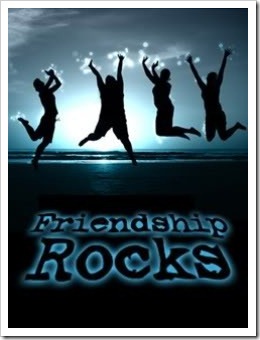No love, no friendship, can cross the path of our destiny without leaving some mark on it forever
– Francois Mocuriac

Friends and friendships are very important to all people, even to those who find it hard to admit, and what social skills we do not have naturally, we can develop. We can learn how to be friendly.
In the past year, I have had many opportunities to talk and write about my successes. When I examined each of them, I realized that being a very social creature, loving people, understanding the way they function and using my good social skills were real assets to me.
Social skills – Nature or Nurture?
I have not always been a very friendly person. Not that I did not like company, but until the age of 16, I did not really understand the social rules I needed to live by. I had no friends, I got into frequent conflicts with the ones I did hang around with and I was lonely and miserable. My parents had no friends either, so I could not learn from them the right things to say and do around other people.
Then, I stopped reacting without thinking about the impact it has on my relationships and I learned that friendly people are happy people and that social skills can be learned.
Friend – a person known well to another and regarded with liking, affection and loyalty
– Collins English Dictionary
I only had a chance to read “How to win friends and influence people” by Dale Carnegie when I was 40 years old. It was not an easy read, but reading it triggered a mixture of happiness and sadness in me. Happiness that I had discovered all the things Dale Carnegie wrote in the book and sadness that circumstances had not brought this book into my life long before to save me the heartache and pain of discovering things the hard way.
I am sure there are many people who wonder, like I did, how life would have been if they knew the rules of social interaction. The more I think about it, the more I believe that it is parents’ responsibility to teach their kids those skills. You cannot expect a disturbed 10-year-old or 14-year-old girl to go to the library, pick up Dale Carnegie’s book and have the ability to implement it. I know many adults (too many, unfortunately) who read the book, or similar books, but that was not enough to teach them how to be friendly.

Some theories claim that social ability is genetic, while others consider it a learned skill. I tend to think it is a mixture of both and believe we need to focus on what we can do, rather than what we cannot do – every person can become a bit friendlier than he or she was in the past and therefore a bit happier than he or she would be otherwise.
Circle of friends
Although the number of friends is an indication to how friendly you are, it is also important to consider the level of friendship. One good way of realizing your social interaction is to do the circle of friends’ activity.
Write your name in the middle, then write all those you consider friends and put them in the circle that matches how close are they to you. Consider their friendships in terms of how much you like them, how much they like you and how often you interact with them. The more close friends you have, the friendlier you are and the happier your life is.

In any interaction, the goal is to benefit from the relationship and make sure the other person benefits from it too and would like to stay in this relationship. Our goal is to make the interaction pleasant to both sides.
Dale Carnegie talked about some basic techniques to win friends. He even thought they were fundamental to success in life through our ability to influence people. Read this list and examine your friendliness skills by rating your ability from 1-10.
- In your interaction with others, do not criticize. Criticism is the opposite of being friendly. It changes the balance between equal people to one considering himself/herself better. Do not confuse feedback with criticism. Criticism is always considering your point over the other.
- Do not condemn others for their actions and behavior. Again, this destroys the fine balance that is required in a pleasant interaction. When you condemn people, you are stating that there is right and wrong. This only proves you are not a close enough friend as you have no idea what would make this person behave the way he/she did.
- Do not complain. Complainers are not friendly by definition. The things they complain about are more important to them than the friendship and others do not like hanging around them for long. Complaining and being pleasant do not go hand in hand and the excuse that the complaint contributes to a better relationship does not convince anyone. Only a masochist will believe that in order to have a good relationship, they need to please the other person.
- Do not nag. Nagging is another way of criticizing, condemning and complaining. It is a sign you are not in an equal relationship. Nagging is a sign you think your opinion is superior and that you rather the other person do what you want even if it is done by force.
If you judge people, you have no time to love them
– Mother Teresa
- Give honest and sincere appreciation. The opposite of the first four behaviors that destroy the balance is to show and express appreciation. Say good things about your friend. Generally, saying good things about others (only if they are true) makes others consider you a friendly person that sees the good in others. Use praises at the beginning of your words and always be honest. If you are forced to show appreciation – it is not honest. If one person in your relationship demands appreciation, this changes the balance and forces one side to be dishonest, which is a sign of problems in the relationship.
- Avoid arguments. In any argument, there are two sides. Both of them are valid and no matter what happens, it will be a lose-lose interaction that no one would like to repeat. Argumentative people do not have many friends, because they are energy consumers and exhausting to spend time with. If you start an argument, consider the friendship and choose to lose the argument and not the friendship. If you feel you need to win an argument, you have already lost.

- Use people’s names. Everyone likes the sound of his or her name. I have seen people in networking events abuse this tip and when I hear my name for the third time in a short period, it turns me off. On the other hand, some people tend to talk to others without using their names at all. Remembering someone else’s name is very important and it is better to ask, “Can you remind me of your name again?” than not to use the name at all (or to guess it incorrectly). With close friends, it is never an issue of remembering, but of making an effort to use it.
The best mirror is an old friend
– George Herbert
- Be a good listener and encourage others to talk about themselves. In every interaction, measure how long you speak and how long the other person speaks. The one who speaks less is considered friendlier. In an interaction with others, there should be an equal share of contribution. Although it is not easy to use a stopwatch, it is good to be aware of who takes over the conversation. Those who take over the conversation usually consider the topic more important than the friendship and chase people away.
- When talking, talk about terms that are appealing to the other person. If you insist on talking about things that are of interest to you and not the other person, you lose your audience immediately. If you use vocabulary that the other person uses, the conversation is much easier. If you insist that the conversations include things that are of interest to you and that your goal is to convert the listener to your point of view, consider the interaction lost. Interaction is similar to playing ball. If one person holds the ball tight, there is no game.
- Be genuinely interested in other people. When you do listen and encourage others to talk, make it genuine and sincere. To show interest in people, you need to ask questions. If the questions are not sincere and you just wait for the other person to finish so you can have a say too, this will be easily picked up by the other person, create a problem of trust between you and they will say to themselves, “She really didn’t want to know the answer, so why bother?”
- Make the other person feel important and special and be honest with it. Carnegie talked about honesty a lot. He thought that using his tips without really meaning it defeats the purpose of building social skills. The mechanics of showing interest in others and making another person feel special cannot be cheated. Either you think the other is special and important or you do not. You cannot fake it. If you talk to the other person as if there is nothing special about them, there is always the question of “Then why do you spend time with me?” Ask yourself, “Why do I want to be in this person’s company?” and use the answer to tell this person what is special about them that makes them attractive to you. Saying, “Well, I didn’t have anyone else to talk to”, is not a friendly thing to say. Be careful not to badmouth others to make your friends feel special. If you do that, it is risky to be your friend, because one day you might talk like that about them.

- When a person is upset, do not talk negatively, only talk about the positive. Friends are there to help each other. If you talk negatively, you are not creating rapport but dragging your friend down. Do your best not to judge, not to offer explanations for why they are upset or what they could have done better to not be in that place. If they are upset, they do not need your judgment on top of it.
- Do not try to change your friend. Instead, try to see things from their point of view. In any relationship, there are conflicts. No two people do, act, say and treat things exactly the same way, but that does not need to come between friends. If you think a friend has done something that you consider inappropriate, strange or unkind, try to put yourself in his or her shoes. Friendship does not give you the right to change the other person but to understand them.
- Be courteous. This is strongly linked to respect and keeping the trust between people. If you feel you need to use information you have of other people to gain power, you are not a good friend and it will be hard for your to build this trust again.
I count myself in nothing else so happy as in a soul rememb’ring my good friends
– William Shakespeare
How to be friendly and happy
In some positions, you are in charge and need to lead others in doing things. It can be as a parent, as a manager or even within the scope of teamwork. People will follow and listen to those who lead with friendly behavior and will resent those who are not friendly.

- If you do make a mistake, say, “My mistake, sorry”. It makes you look human to those who work with you. Much like not making a fuss about the mistakes of others, make sure not to make a fuss about your own mistakes. Generally, focusing on mistakes is not a good social skill, so move on and talk about the good stuff.
- Ask questions instead of giving orders. Use “Can you please bring me the letters” instead of “Bring me the letters, please”. When it is asked as a question, it gives the other person the chance to say, “No, I can’t right now. I am doing something else” instead of putting pressure on them to follow your orders even when they cannot.
- Praise every improvement. Everyone likes to be praised and every time you praise, you are considered kind and friendly, as if you can read peoples’ good motives and behavior. Give people a fine reputation to live up to.
The art of happiness is strongly related to our ability to connect with people and knowing how to be friendly. Most of the big successes start with someone knowing someone who knows someone and the willingness to be friendly and help. I can tell you for sure that my successes have followed this pattern. Friends are like a big family and having a big family contributes to happiness.
Wishing you many friends and lots of happiness that comes with friendship,
Ronit














